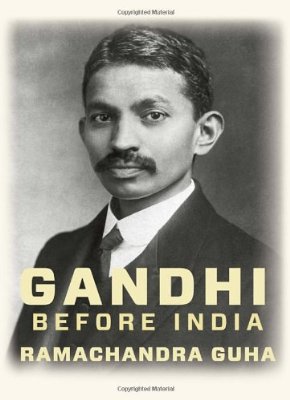"Gandhi Before India" by Ramachandra Guha

Gandhi: South Africa's greatest gift to the world.
A modern equivalent would be Al Gore pushing his cause for man caused warming by using no fossil fuel fired transportation. He would start by only riding a bicycle. If he had to meet discuss with people out of his area he would do by teleconference.
Completed book 06 August 2016. 550 pages.
Diminutive, devout, young Hindu, son of Dewan (prime minister) of tiny princely state of Porbandar, in Gujarat, is sent to London to become a barrister.
Returns to India qualified, but can't find a job.
Answers an ad from Gujarati businessman in Durban who needs an Indian lawyer to resolve a business related dispute.
Spends 21 years in South Africa taking up the cause of Indians and Chinese who were not given rights as citizens.
Preached non violence in two satyagrahas (1906 and 1913) where he and his followers walked the talk, going to jail numerous times for violating laws they felt were discriminatory.
Gandhi, becoming somewhat of an ascetic, subordinated personal life, including, at times family, to his ecumenical cause - he brought together Hindus, Muslims, Chinese, Christians and Jews.
With the help of his Jewish architect friend, Hermann Kallenbach and his 20 year Jewish secretary, Sonja Schlesin, and others, he pragmatically paced his demands, incurring at times the wrath of critics who believed he was moving get too slowly.
Tolstoy became a backer of his quest. Ratan Tata funded the growth of his Durban based news paper, "Indian Opinion." The paper gave him a platform to spread his ideas throughout the world.
Jan Smuts, who occupied various government positions during Gandhi's 21 year stay in South Africa, was, at once Gandhi's nemesis, but also the influential pol who stepped up to pass the Indian Relief Act, in 1914.
The act eliminated a pernicious L3 tax on all Indians, legalized Indian religious marriages, and relaxed immigration controls.
Gandhi, now a world figure, left South Africa in 1914 and returned to India to work his magic of non violent resistance to achieve Indian independence from Britain in 1948.
The South Africa years set the stage for the work in India. Had Gandhi got a job in India after returning from London as a young barrister, he would have likely lived his life in comparative anonymity.
Doesn't read like a novel. But, good book. It's history!
Lessons:
Lesson One. Walking the talk begets credibility. Gandhi became and ascetic, giving up most personal pleasures... sex, spices on his food, conventional clothing etc. and dedicated all to the pursuit of eliminating barriers to equality for Asians in South Africa. A modern equivalent would be Al Gore pushing his cause for man caused warming by using no fossil fuel fired transportation. He would start by only riding a bicycle. If he had to meet discuss with people out of his area he would do by teleconference.
Lesson Two. Differentiate between that which is possible and that which is patently unachievable. Gandhi's critics felt he should have demanded full and equal citizenships for Indians. Gandhi knew that full rights was unachievable. Jan Smuts (who in the end respected Gandhi) gave Gandhi enough trouble with fighting immigration controls, honoring Indian marriages, and eliminating a pernicious tax imposed only on minorities.
Lesson Three. Publish. "Indian Opinion" was a way for Gandhi to broadcast the plight of the Indians in South Africa and to put forward his own views on many subjects. These words eventually reached the likes of Leo Tolstoy of Rabindranath Tagore who rallied publicly to support his cause.
Lesson Four. Walk. Gandhi, like Gabriel Allon, was a walker. He often walked over ten miles a day to get to work, meetings and back home. In addition to benefiting fitness, Gandhi found walking a time for his best reflection.
Lesson Five. TBD